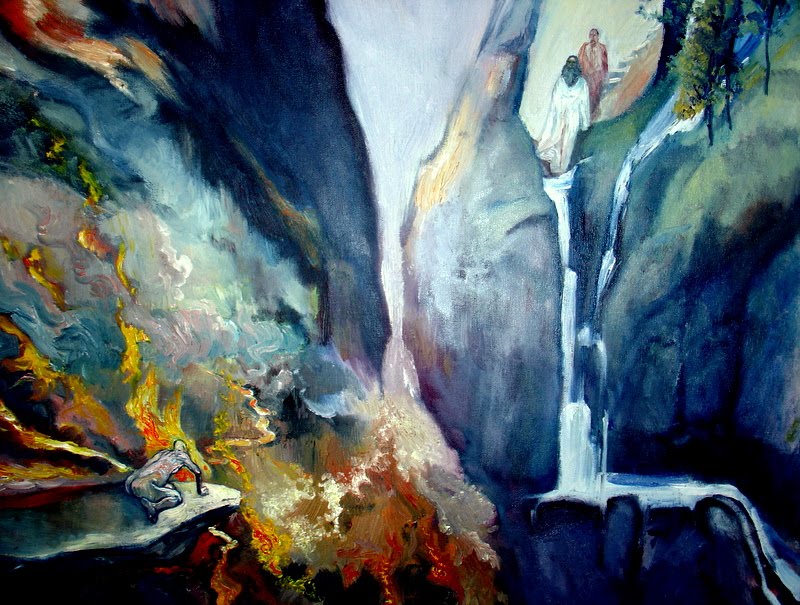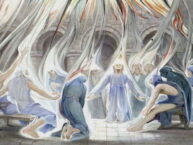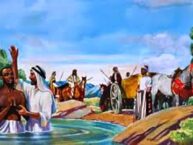 September 25, 2022: May God’s words be spoken, may God’s words be heard. Amen.
September 25, 2022: May God’s words be spoken, may God’s words be heard. Amen.
This past week we witnessed the funeral of a great woman of faith…two, really. Her Majesty, Queen Elizabeth II, and Sheila Jackson, a member of our parish. The liturgy of the services for the State Funeral & Committal of the Queen moved my heart, not only for the beauty of our Anglican worship, which has always touched my soul in word and music, but that at the funerals for each of is, it is much the same. Yesterday’s funeral for Sheila Jackson included very similar prayers and hymns. While there was no earthly crown visible yesterday on the casket, Sheila, like Queen Elizabeth, will receive the same eternal crown of glory which never fades away. That is our faith, and death is one of those great equalizers of our human existence, isn’t it.
And that is some of what we are hearing in today’s gospel. Now, you may have thought when the gospel first opened that you were getting a repeat of last week, because Jesus starts this parable the same way “There was a rich man…”. That also explains why I started to read the wrong gospel last week, but let’s not go there.
Jesus began this whole thing a few chapters ago, or for us, two Sundays ago. That was Chapter 15, and he was talking to the Pharisees and scribes in response to the derision at him hanging out with the “wrong crowd.” He told them the two of the three parables of the lost, of which we heard two – the sheep and the coin (we heard about the lost son on the fourth Sunday of Lent a few months ago). Then last week, from chapter 16, we heard Jesus speaking to his followers, and he told the parable of the rich manager. And now to this week’s episode on the Jesus Tells Parables Channel – he is again speaking to the Pharisees and scribes, who don’t like the other parables Jesus just told them, so he gives them one more about a rich man and a poor man – and no, it isn’t about the miniseries from 1976.
The rich man in this parable is never named, but the poor man is called Lazarus (not to be confused with Mary and Martha’s brother whom Jesus brought back from the dead). Anyway, the rich man…okay – you know I need to give this guy a name…let’s call him, well…how about Richard or Rick for short! Anyway, Rick had fine clothes and lots of food, but Lazarus, whom Jesus points out was right outside his door (or gate), lay hungry, thirsty, and in pain from sores that were left untreated. All Lazarus wanted in the world were just the scraps that might fall from Rick’s table, but they never did.
Lazarus died, and…because wealth does not buy you immortality, so too does Rick. They end up in very different places in the eternal afterlife – one in heaven, the other in hell. The long and short of the rest of it is that Rick finally sees he has erred, and begs Abraham to send Lazarus to warn his five brothers so that they might change their ways and avoid his fate. Abraham refuses in a prophetic way. Here is how that part goes down. Rick says “…`father Abraham; …if someone goes to them from the dead, they will repent.’ He said to him, `If they do not listen to Moses and the prophets, neither will they be convinced even if someone rises from the dead.”
Leaving the drop mic moment that this must have been for the disciples when they encounter the risen Jesus, and remember this parable he told, let’s go back to what Jesus is saying here. Before we dig deeper, remember that parables are not meant to be full theological discourses of our entire faith. They are simple stories to relay a point, or several points, depending on the circumstances, and when it comes to the ones Jesus tells, they are seldom about what you think they are about. This one is no different.
So right up front, let’s be clear about one thing: This parable is not about wealth.
Jesus is not condemning those who have money.
Jesus is talking about something that afflicts both the rich and the poor. That said, let’s go back then to look at what happens a little more closely. Rick wants to warn his brothers that they may avoid his peril. Right there we see that he still does not get it. Right in that part of the passage we come to find what Jesus was really talking about. Rick wants to warn his brothers, but here’s the thing that he missed in his life on earth…
Lazarus is his brother!
That is what Jesus is telling everyone here. Does Rick not see that Abraham, whom he calls father Abraham, is not also father Abraham to Lazarus, whom he now comforts?
The reason Rick is in hell is because he refused to see someone so different than himself as his brother. For that matter, he didn’t even see Lazarus. He allowed Lazarus, his brother to lay in pain by his gate never aiding him in his distress. So, this parable is not about wealth – it is about identity & relationship, and how we define family.
And here’s the thing for us about this parable now – Can we figure out who Lazarus is today? Because if we cannot, we risk making the same mistake as Rick.
The sores of Lazarus in the lives of sisters and brothers at our gates now may not be as visible as the ones that Jesus describes in the parable, but they are there, if we will only open our eyes and look with the compassion of Jesus.
They are the sores of the chains of racism, sexism, heterosexism, and the other ways we hate that have cut into the very flesh of our sisters and brothers.
They are the sores of shattered glass that wound the heart of our Jewish sisters and brothers, and those of other faiths who endure our violence against them in word and deed.
They are the sores of opioid addiction that wracks the body in pain and the soul in torment through the greed of drug companies and a broken healthcare system.
They are the sores of the animal kingdom entrusted to us by God suffocating under the weight of our neglect and abuse of creation.
Do we see the sores? Do we even see Lazarus among us? Or have we also set a chasm between ourselves and the ones who cry out in pain that we cannot hear them, see them, go to them?
The themes over these past weeks we have heard in these parables of Jesus is asking us “who have we chosen to serve, as our community, as our family?” Because this life is not forever, but the one into which we will travel is. Jesus is warning us to make that future even more present in our lives here on earth.[1]
Jesus was always reminding us that the kingdom of God is here, now – and we are to live in beloved community with one another – all of us sisters and brothers, all of us made the image of God, all of us called to bridge the chasms that exist through our lives in Christ.
In his sermon at Dexter Avenue Baptist Church on October 2, 1955, the Rev. Dr. Martin Luther King Jr. preached on this very passage. Now, there was a time when the rich man had been given a name that meant “rich” in Latin, so he was called Dives and that is what Dr. King used, as well as the term gulf, the King James version of chasm.
Anyway, in that sermon King said this “Dives’ greatest sin was that he accepted the inequalities of circumstance as being the proper conditions of life. There is a gulf that originates in the accident of circumstance. Circumstances make it possible for some people to get an education, while other people are denied the opportunity. Circumstances make some people rich, social prestige, while others are left gnawing on the crumbs of obscurity. There are certain gulfs in life which originate in the accident of circumstance. So in the parable Lazarus was poor, not because he wanted to be, but because tragic circumstances had made him so. On the other hand, Dives was rich because fortunate circumstances had made him so. There is a circumstantial gulf between Lazarus and Dives.
Now Dives’ sin was not that he made this gulf between him and Lazarus; this gulf had come into being through the accidents of circumstance. The sin of Dives was that he felt that the gulf which existed between him and Lazarus was a proper condition of life. Dives felt that this was the way things were to be. He took the “isness” of circumstantial accidents and transformed them into the “oughtness” of a universal structure. He adjusted himself to the patent inequalities of circumstance.[…]
Dives sin was not that he was cruel to Lazarus, but that he refused to bridge the gap of misfortune that existed between them. Dives sin was not his wealth; his wealth was his opportunity. His sin was his refusal to use his wealth to bridge the gulf between the extremes of superfluous, inordinate wealth and abject, deadening poverty.”
“He took the “isness” of circumstantial accidents and transformed them into the “oughtness” of a universal structure. He adjusted himself to the patent inequalities of circumstance.”
The questions for us all today is where are we doing the same?
Where are we taking the “isness” of circumstantial accidents and transforming them in the “oughtness” of a universal structure?
Where are we adjusting ourself to the patent of inequalities of circumstance?
What chasms of inequality will we bridge by offering our lives to spread the unconditional love of God?
What hunger can we from what we have been given by God satisfy?
What sores will we heal by the grace of Jesus Christ working in us?
While both Sheila and Queen Elizabeth II had long lives, many of us will not be able to say the same. No matter how much time we have, death is the great equalizer, and we will all stand before our God with nothing but the acts we have done while walking on this earth.
Dr. King, in that sermon, added this: “…Time has run out. The tragic words, too late, must now be, marked across the history of Dives’ life.”
The final question for us all, the one Jesus is asking in this parable, the one we must all ask ourselves each and every day, is this…
What words will be marked across the history of our lives when our time has run out?
Amen.
For the audio, click below, or subscribe to our iTunes Sermon Podcast by clicking here (also available on Audible):
The Rev. Diana L. Wilcox
Christ Church in Bloomfield & Glen Ridge
September 25, 2022
Pentecost 16 – Year C – Proper 21 – Track 1
1st Reading – Jeremiah 32:1-3a, 6-15
Psalm 91:1-6, 14-16
2nd Reading – 1 Timothy 6:6-19
Gospel -Luke 16:19-31
[1] From thoughts provided by Sermon Brainwave through workingpreacher.org.






